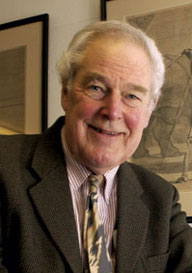
For Release: November 8, 2007
Contact: DMS Communications 603-650-1492
Outcomes Pioneer Wennberg Receives Two Prestigious Awards

Dr. John E. Wennberg
HANOVER, NH—Dr. John E. (Jack) Wennberg, founding editor of the Dartmouth Atlas of Health Care at Dartmouth Medical School, has recently received two major awards for his contributions to medicine and health policy.
Last week, Wennberg was named by Health Affairs magazine as "the most influential health policy researcher of the past 25 years." This week, he received the 2007 Ernest Amory Codman Award from the Joint Commission, the nation's predominant standards-setting and accrediting body in health care, for his leadership in using outcomes measures to improve health care quality and safety.
Wennberg, the Peggy Y. Thomson Chair in the Evaluative Clinical Sciences, is a professor of community and family medicine and of medicine at DMS. An epidemiologist, he is the founder and director emeritus of Center for Evalutaive Clinical Scineces, now The Dartmouth Institute for Health Policy and Clinical Practice.
Both recent awards highlight Wennberg's pioneering research of the past 30 years, which has focused on regional variations in medical care, outcomes of medical treatment and shared decision-making. He was among the first researchers to document how variations in medical treatment patterns affect the cost and quality of patient care, and how they are primarily due to physician treatment styles.
Wennberg helped shape the legislation that established the Agency for Health Care Policy and Research—now known as the Agency for Healthcare Research and Quality (AHRQ)—by attracting Congressional attention to outcomes research. The results of his research have led policymakers, healthcare providers and consumers to examine more closely the appropriateness and cost-effectiveness of patient care.
"When Jack started his work, geographic variation in health care—and the resulting variation in healthcare costs—was largely unknown and unremarked upon," said Health Affairs founding editor John Inglehart, who presented the journal's award at the recent Health Policy Summit in Washington DC "Thanks to Jack's persistence, the idea that the care you receive is largely determined by where you live—and not necessarily by what is most appropriate for you—has become part of the common parlance of health policy."
The most influential health policy researcher of the past 25 years.
—Health Affairs magazine
The Joint Commission's Ernest Amory Codman Award annually recognizes individuals and organizations for "innovative approaches and commitment to using performance measurement to improve the quality and safety of health care," said Dr. Dennis S. O'Leary, president of the Joint Commission. "The achievements of the winners demonstrate the progress that can be made when performance measurement leads to meaningful practices that benefit patients."
"Dr. Wennberg's analyses of health care performance to improve quality are an exemplar for our nation," said Dr. Thomas A. Colacchio, president of the Dartmouth-Hitchcock Clinic. "His analysis of practice patterns to measure our nation's health has had a dramatic influence on health care delivery and public policy throughout the United States and, in fact, the world."
With colleague Dr. Alan Gittelsohn, Wennberg developed a method of determining population-based rates for the utilization and distribution of health care services. This method, called small area analysis and first published in 1973, revealed large variations in health care usage among different areas.
Work to uncover the reasons behind these variations led Wennberg and his colleagues to develop techniques to document the results of common medical practices, a strategy that came to be called outcomes research. This research has demonstrated remarkable variations in important aspects of health care use, such as the number of hospital beds and physicians per capita, and the rates of hospital use and of specific surgical procedures. His latest work has focused on the use of patient decision aids to help patients understand their treatment options and participate in medical decision making.
Wennberg received his medical degree from McGill University School of Medicine and his master of public health degree from the Johns Hopkins University School of Hygiene and Public Health.
For more information about the Joint Commission and the Ernest Amory Codman Award, go to http://jointcommission.org. More information about Health Affairs (as well as Wennberg's most recent article, "Extending the Pay for Performance Agenda: How Medicare Can Improve Patient Decision Making and Reduce Unnecessary Care") can be found at http://healthaffairs.org.
-DMS-